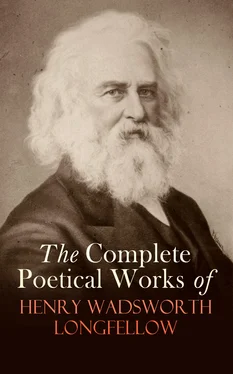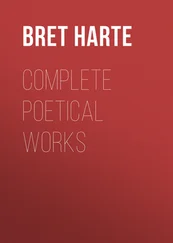When the chase is done, will return again to the Mission."
Then Evangeline said, and her voice was meek and submissive,
"Let me remain with thee, for my soul is sad and afflicted."
So seemed it wise and well unto all; and betimes on the morrow,
Mounting his Mexican steed, with his Indian guides and companions.
Homeward Basil returned, and Evangeline stayed at the Mission.
Slowly, slowly, slowly the days succeeded each other—
Days and weeks and months; and the fields of maize that were springing
Green from the ground when a stranger she came, now waving above her,
Lifted their slender shafts, with leaves interlacing, and forming
Cloisters for mendicant crows and granaries pillaged by squirrels.
Then in the golden weather the maize was husked, and the maidens
Blushed at each blood-red ear, for that betokened a lover,
But at the crooked laughed, and called it a thief in the corn-field.
Even the blood-red ear to Evangeline brought not her lover.
"Patience!" the priest would say; "have faith, and thy prayer will be answered!
Look at this vigorous plant that lifts its head from the meadow,
See how its leaves are turned to the north, as true as the magnet;
This is the compass-flower, that the finger of God has planted
Here in the houseless wild, to direct the traveller's journey
Over the sea-like, pathless, limitless waste of the desert.
Such in the soul of man is faith. The blossoms of passion,
Gay and luxuriant flowers, are brighter and fuller of fragrance,
But they beguile us, and lead us astray, and their odor is deadly.
Only this humble plant can guide us here, and hereafter
Crown us with asphodel flowers, that are wet with the dews of nepenthe."
So came the autumn, and passed, and the winter—yet Gabriel came not;
Blossomed the opening spring, and the notes of the robin and bluebird
Sounded sweet upon wold and in wood, yet Gabriel came not.
But on the breath of the summer winds a rumor was wafted
Sweeter than song of bird, or hue or odor of blossom.
Far to the north and east, it said, in the Michigan forests,
Gabriel had his lodge by the banks of the Saginaw River,
And, with returning guides, that sought the lakes of St. Lawrence,
Saying a sad farewell, Evangeline went from the Mission.
When over weary ways, by long and perilous marches,
She had attained at length the depths of the Michigan forests,
Found she the hunter's lodge deserted and fallen to ruin!
Thus did the long sad years glide on, and in seasons and places
Divers and distant far was seen the wandering maiden;—
Now in the Tents of Grace of the meek Moravian Missions,
Now in the noisy camps and the battle-fields of the army,
Now in secluded hamlets, in towns and populous cities.
Like a phantom she came, and passed away unremembered.
Fair was she and young, when in hope began the long journey;
Faded was she and old, when in disappointment it ended.
Each succeeding year stole something away from her beauty,
Leaving behind it, broader and deeper, the gloom and the shadow.
Then there appeared and spread faint streaks of gray o'er her forehead,
Dawn of another life, that broke o'er her earthy horizon,
As in the eastern sky the first faint streaks of the morning.
Table of Contents
In that delightful land which is washed by the Delaware's waters,
Guarding in sylvan shades the name of Penn the apostle,
Stands on the banks of its beautiful stream the city he founded.
There all the air is balm, and the peach is the emblem of beauty,
And the streets still re-echo the names of the trees of the forest,
As if they fain would appease the Dryads whose haunts they molested.
There from the troubled sea had Evangeline landed, an exile,
Finding among the children of Penn a home and a country.
There old Rene Leblanc had died; and when he departed,
Saw at his side only one of all his hundred descendants.
Something at least there was in the friendly streets of the city,
Something that spake to her heart, and made her no longer a stranger;
And her ear was pleased with the Thee and Thou of the Quakers,
For it recalled the past, the old Acadian country,
Where all men were equal, and all were brothers and sisters.
So, when the fruitless search, the disappointed endeavor,
Ended, to recommence no more upon earth, uncomplaining,
Thither, as leaves to the light, were turned her thoughts and her footsteps.
As from a mountain's top the rainy mists of the morning
Roll away, and afar we behold the landscape below us,
Sun-illumined, with shining rivers and cities and hamlets,
So fell the mists from her mind, and she saw the world far below her,
Dark no longer, but all illumined with love; and the pathway
Which she had climbed so far, lying smooth and fair in the distance.
Gabriel was not forgotten. Within her heart was his image,
Clothed in the beauty of love and youth, as last she beheld him,
Only more beautiful made by his deathlike silence and absence.
Into her thoughts of him time entered not, for it was not.
Over him years had no power; he was not changed, but transfigured;
He had become to her heart as one who is dead, and not absent;
Patience and abnegation of self, and devotion to others,
This was the lesson a life of trial and sorrow had taught her.
So was her love diffused, but, like to some odorous spices,
Suffered no waste nor loss, though filling the air with aroma.
Other hope had she none, nor wish in life, but to follow
Meekly, with reverent steps, the sacred feet of her Saviour.
Thus many years she lived as a Sister of Mercy; frequenting
Lonely and wretched roofs in the crowded lanes of the city,
Where distress and want concealed themselves from the sunlight,
Where disease and sorrow in garrets languished neglected.
Night after night, when the world was asleep, as the watchman repeated
Loud, through the gusty streets, that all was well in the city,
High at some lonely window he saw the light of her taper.
Day after day, in the gray of the dawn, as slow through the suburbs
Plodded the German farmer, with flowers and fruits for the market,
Met he that meek, pale face, returning home from its watchings.
Then it came to pass that a pestilence fell on the city,
Presaged by wondrous signs, and mostly by flocks of wild pigeons,
Darkening the sun in their flight, with naught in their craws but an acorn.
And, as the tides of the sea arise in the month of September,
Flooding some silver stream, till it spreads to a lake in the meadow,
So death flooded life, and, o'erflowing its natural margin,
Spread to a brackish lake, the silver stream of existence.
Wealth had no power to bribe, nor beauty to charm, the oppressor;
But all perished alike beneath the scourge of his anger;—
Only, alas! the poor, who had neither friends nor attendants,
Crept away to die in the almshouse, home of the homeless.
Then in the suburbs it stood, in the midst of meadows and woodlands;
Now the city surrounds it; but still, with its gateway and wicket
Meek, in the midst of splendor, its humble walls seem to echo
Softly the words of the Lord:—"The poor ye always have with you."
Thither, by night and by day, came the Sister of Mercy. The dying
Looked up into her face, and thought, indeed, to behold there
Gleams of celestial light encircle her forehead with splendor,
Such as the artist paints o'er the brows of saints and apostles,
Читать дальше












